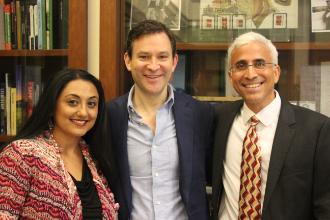Dan Harris – co-anchor of “Nightline,” “Good Morning America” correspondent and frequent contributor to other ABC news programs – likens meditation to going to the gym.
“It’s hard, but it’s worth it,” he told University of Miami students and alumni, and community members, last week during a UMindfulness Lecture. “If it’s easy, you’re most likely cheating.”
 |
| Dr. Amishi Jha, director of contemplative neuroscience and associate professor of psychology in the UM College of Arts & Sciences; Dan Harris, ABC news correspondent and anchor; and Scott Rogers, director of the Mindfulness in Law Program at the UM School of Law. |
By meditating for just five minutes per day, “you can train your mind the way you can train your body in the gym,” Harris said, calling meditation “a bicep curl for the brain.”
The UMindfulness Lecture Series is an outreach activity of the UMindfulness Research and Practice Initiative. Led by Dr. Amishi Jha, director of contemplative neuroscience and associate professor of psychology in the UM College of Arts & Sciences, and Scott Rogers, director of the Mindfulness in Law Program at the School of Law, UMindfulness brings together cutting-edge brain research and mindfulness/contemplative practice training.
Harris discussed his New York Times best-selling book, 10% Happier: How I Tamed the Voice in My Head, Reduced Stress Without Losing My Edge, and Found Self-Help That Actually Works – A True Story.
The book details Harris’s journey to meditation, which began after he suffered an on-air panic attack during a national broadcast in 2004 – the culmination of long-term determined professional ambition, relentless self-doubt and creeping depression.
After returning from three years covering the conflicts in Afghanistan, Israel and Iraq, Harris started “to self-medicate, dabbling with cocaine and ecstasy,” which led to panic attacks. Following what he calls “the most humiliating day of my life,” Harris stopped using drugs and began seeing a therapist.
He also started looking for a way to deal with the “crazy voice in (his) head” – a force he calls “a malevolent puppeteer” in the introduction to his book.
“It’s a fever swamp of urges, desires, and judgments. It’s fixated on the past and the future, to the detriment of the here and now. It’s what has us reaching into the fridge when we’re not hungry, losing our temper when we know it’s not really in our best interest, and pruning our inboxes when we’re ostensibly engaged in conversation with other human beings,” he wrote.
Harris was initially doubtful about meditation. He found many books about meditation “totally repellant, written in a way that is off-putting and very, very annoying.”
However, the scientific evidence about the benefits of meditation convinced him to give it a try. Research has shown that meditating lowers blood pressure, bolsters the immune system, re-wires the brain to help practitioners better handle stress and pain, keeps memories sharp, and more.
Since he started meditating, Harris said, he has seen three major changes. He is more focused, calmer, and more mindful, having developed the ability “to notice what is happening in (his) mind, without getting carried away.”
When Harris feels himself becoming stressed – for example, worrying incessantly about missing an upcoming flight – he asks: “Is this useful?” This helps him “draw the line between constructive anguish and useless rumination.”
Harris now meditates for 35 minutes each day, but he believes that engaging in the practice for even five minutes can be beneficial.
“The whole game is to get lost and start again, get lost and start again. It can change your view of yourself in the world,” Harris said.
The next UMindfulness Lecture will feature Congressman Tim Ryan (D-Ohio), author of A Mindful Nation and an outspoken advocate of meditation. It will take place on Monday, November 10, at 5:30 p.m. in the Newman Alumni Center.
September 18, 2014

